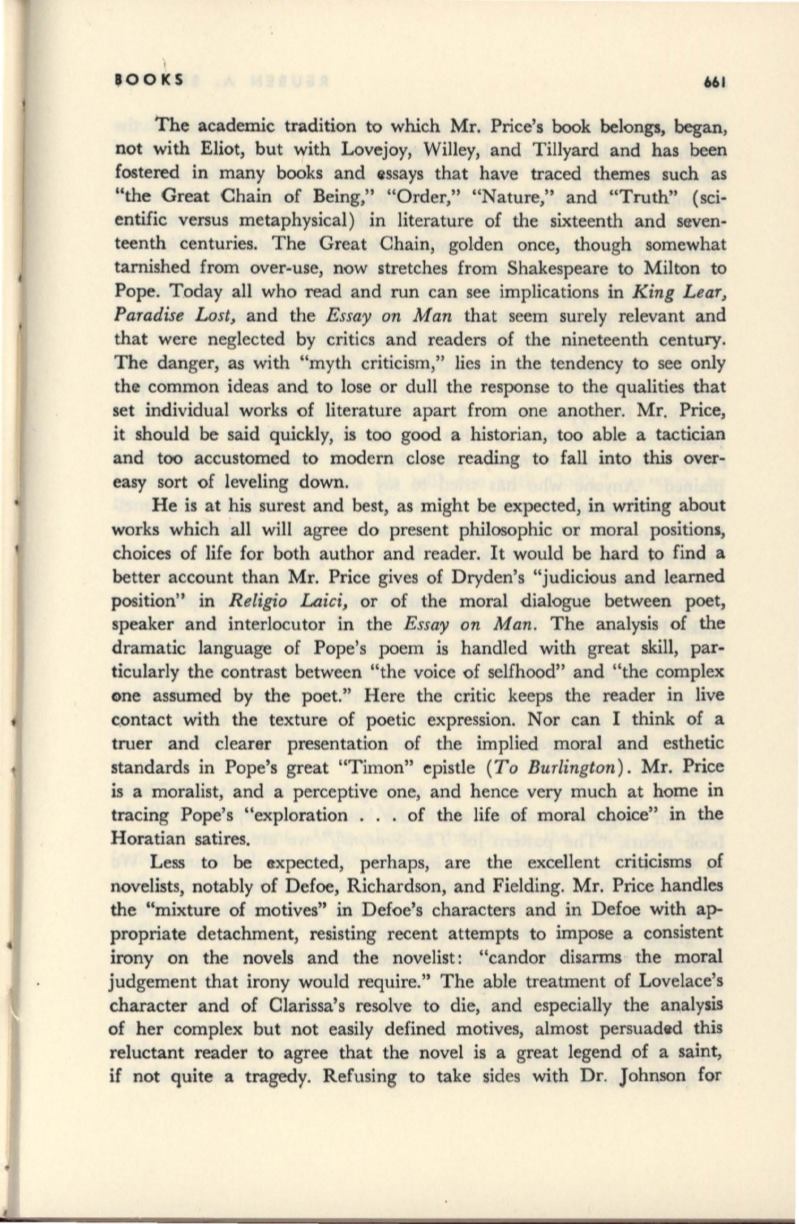

I
,OOKS
661
The academic tradition
to
which Mr. Price's book belongs, began,
not with Eliot, but with Lovejoy, Willey, and Tillyard and has been
fostered in many books and
~ssays
that have traced themes such as
"the Great Chain of Being," "Order," "Nature," and "Truth" (sci–
entific versus metaphysical) in literature of the sixteenth and saven–
teenth centuries. The Great Chain, golden once, though somewhat
tarnished from over-use, now stretches from Shakespeare to Milton to
Pope. Today all who read and run can see implications in
King Lear,
Paradise Lost,
and the
Essay on Man
that seem surely relevant and
that were neglected by critics and readers of the nineteenth century.
The danger, as with "myth criticism," lies in the tendency to see only
the common ideas and to lose or dull the response to the qualities that
set individual works of literature apart from one another. Mr. Price,
it should
be
said quickly, is too good a historian, too able a tactician
and too accustomed to modern close reading to fall into this over–
easy sort of leveling down.
He is at his surest and best, as might be expected, in writing about
works which all will agree do present philosophic or moral positions,
choices of life for both author and reader. It would be hard to find a
better account than Mr. Price gives of Dryden's "judicious and learned
position" in
Religio Laici,
or of the moral dialogue between poet,
speaker and interlocutor in the
Essay on Man.
The analysis of the
dramatic language of Pope's poem is handled with great skill, par–
ticularly the contrast between "the voice of selfhood" and "the complex
Gne assumed by the poet." Here the critic keeps the reader in live
c,ontact with the texture of poetic expression. Nor can I think of a
truer and clearar presentation of the implied moral and esthetic
standards in Pope's great "Timon" epistle
(To Burlington).
Mr. Price
is a moralist, and a perceptive one, and hence very much at home in
tracing Pope's "exploration . . . of the life of moral choice" in the
Horatian satires.
Less to be 6xpected, perhaps, are the excellent criticisms of
novelists, notably of Defoe, Richardson, and Fielding. Mr. Price handles
the "mixture of motives"
in
Defoe's characters and in Defoe with ap–
propriate detachment, resisting recent attempts to impose a consistent
irony on the novels and the novelist: "candor disarms the moral
judgement that irony would require." The able treatment of Lovelace's
character and of Clarissa's resolve to die, and especially the analysis
of her complex but not easily defined motives, almost persuad8d this
reluctant reader to agree that the novel is a great legend ,of a saint,
if not quite a tragedy. Refusing to take sides with Dr. Johnson for









